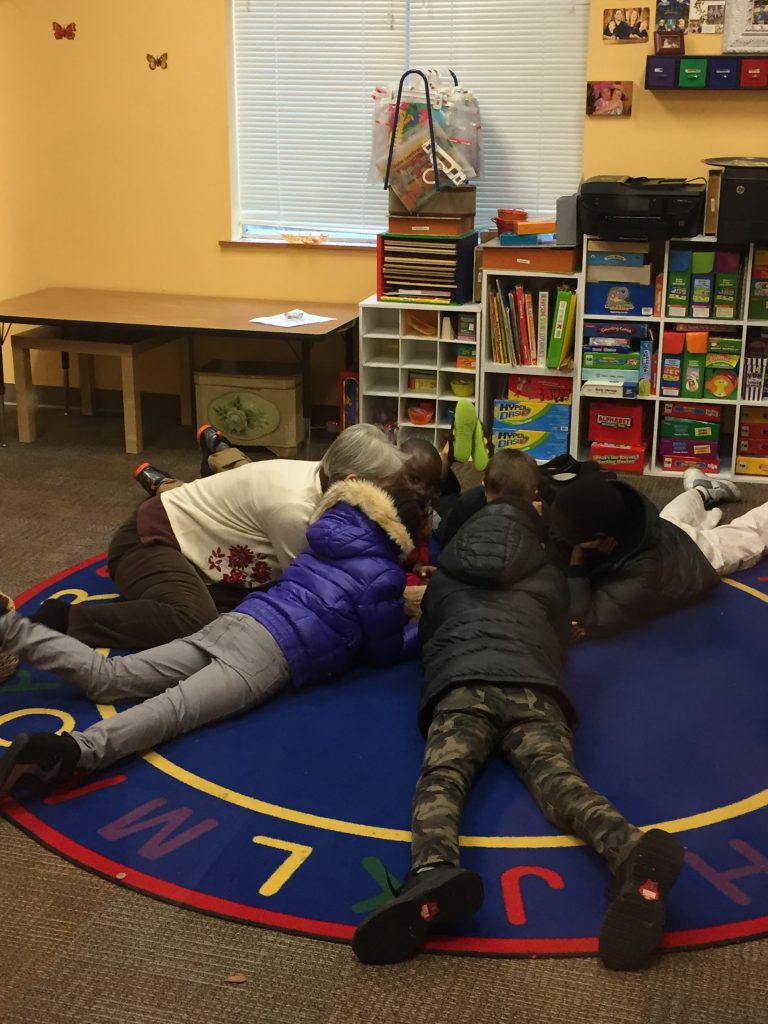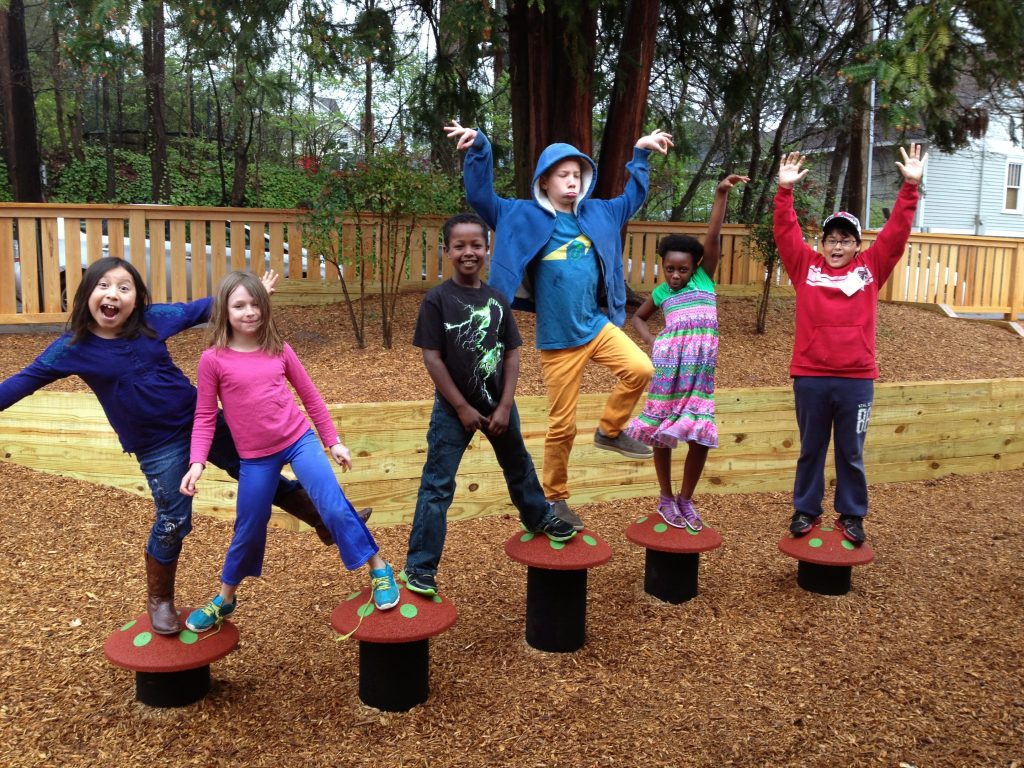The Atlanta Friends Meeting offers First Day* School [FDS] and Nursery care for children from birth through 18, every Sunday. All children are invited to join their parents/guardians in worship for the first 15 minutes on Sunday. After 15 minutes the main doors will be opened and anyone wishing to attend First Day School may leave and go to their classroom. Children under 4 are welcome to go to the nursery for the full hour during worship.
Religious education at Atlanta Friends Meeting is a structured 45 – 60 minutes during which children are provided a supportive environment to explore their values and beliefs and learn about the faith of Friends. We hold at the center of our FDS program that:
- Children have a spiritual life of depth that we may not understand.
- Children are treated seriously with a deep respect.
- Children’s play is their work.
- We are guides. We do not need to have all the answers.
- Classrooms are not “over-adulted.” Storyteller and doorperson are focused on the children and their work.
*Friends use the term First Day to refer to Sunday. You can read more about the history of the “Quaker Calendar” here


Teachers
Teachers at AFM are adults who wish to serve our community by supporting young people ages 3 to 18 to develop their inner spiritual life. Teachers choose to spend one or two Sundays each month with one of our First Day School classes, early elementary, upper elementary, middle and high school. All FDS teachers have completed our child-safety process (see below).
We understand that each child has an inner spiritual life. Teachers at AFM act as guides – offering children content and reflection opportunities that allow them to grow their inner spiritual selves. Teachers of younger children may also be referred to as story tellers – using a variety of resources for the classroom, teacher follow the general structure of the Faith and Play and Sparkling Still curriculum, offering a story followed by wondering questions, and an opportunity to reflect on the learning with work/art/craft.
Teachers in our middle and high school class offer queries and activities that engage adolescents in exploring Quaker Faith and Practice.
Teachers are supported by doorkeepers.
Doorkeepers
Doorkeepers are adults who
- Wish to grow in their relationships with the youngest members of our Meeting.
- Wish to share in the richness of worship as it happens in the religious education classrooms every First Day.
- Want to support the dedicated adults who teach First Day school throughout the year.
- Are looking for a way to serve our community in a new and special way.
The doorkeeper is the first person a child encounters when coming to First Day School. This is the person who gently guides the child from parent to story teller, the person who slows down the child who is in a hurry to be “done” with silence and get on to play, the person who welcomes all with a friendly smile and a focused interest in each child who crosses the threshold into the story circle. This single interaction sets the tone for the rest of the class. To welcome and ask a child if she is ready to join the circle allows each child a sense of belonging and sets the stage for a thoughtful lesson.
The doorkeeper listens to the story and is available to sit with a child who is unable to manage quietly through the lesson. If a child doesn’t seem ready to listen to the story she joins the doorkeeper outside of the circle. The two sit together and listen. This allows the child to continue to be part of the storytelling, without disrupting the other children or the storyteller. The story is for everyone. . . even those who have trouble listening all the time.
The doorkeeper helps the children “help themselves” to get out their reflective work—drawing, journaling, gluing and “stickering,” building, etc. When the work is done, or time is up, the children work together to clean up the space with the doorkeeper. Children who wish to continue interacting with the story, may stay with the storyteller. When they are ready, the doorkeeper and storyteller dismiss children to their parents who have come to pick them up, or walk them together into meeting.
Religious Education Committee
The Religious Education Committee (RE) supports our children from nursery care through high school. The RE committee endeavors to:
- provide a supportive environment for young friends to explore their values and beliefs and learn about the faith of Friends;
- provide worship and learning opportunities outside the larger First Day meeting for young friends;
- recruit, train, and support teachers and doorkeepers;
- foster the relationship between adults and children in the Meeting.
Membership: The Religious Education Committee composed of
- Nominated by Nominating committee:
- The Clerk of RE
- Class Teachers
- The RE Recruitment Liaison to Nominating Committee
- Nursery Liaison
- Recruited by Religious Education Committee:
- Other interested persons who wish to serve on the committee
Additional Volunteers: These volunteers may or may not be members of the Religious Education Committee.
- Door Keepers
- Substitute Teachers
- Summer Program First Day Volunteers
- Nursery Volunteers
AFM Child Safety Policy
Introduction: In building a safe environment for children, we also develop policies that train and protect the adults who work with them. Strong communities that support children have clear guidelines that are followed and keep safety awareness for children at the forefront rather than as an afterthought. As we teach the children and adults in the community about protecting one another, the meeting becomes less attractive to those seeking to harm children.
- All adults should meet the following criteria to work with children under 18 years:
- be active with the Atlanta Friends Meeting for a minimum of one year
- pass the security clearance through the Young Friends Program Coordinator (YFPC)
- sign “Guidelines for Child Safety” and read “Disclosure: What to do When a Child Discloses” from Prevent Child Abuse Georgia (available through the YFPC.
- Parents or adults who are working occasionally in First Day School are not required to meet this criteria if an approved Friendly Adult Nurturer (FAN) is present.
- Occasional teenage babysitters will have completed criteria a. and c. above.
- The YFPC will post in the meeting office his/her own contact information and on an ongoing basis, the names of adults who have completed these requirements successfully and the dates completed, culling and updating the list every 5 years for inactive FANs. The YFPC should keep abreast of the legal issues around child safety and insurance company requirements and routinely share updated information with the Religious Education and Administrative Committees and the AFM clerk.
- In all Meeting activities, the preference is that there be two FANs with the children with the exceptions of the RE classrooms during First Day School. Additional FANs should be arranged for hikes, larger groups, and overnight retreats, per SAYF guidelines and based on the ages of the children.
- In Religious Education classes, children should use the restroom before they come to class, while their parents are still with them, if necessary. Only in an emergency should children be allowed to leave the classroom and in that case, a child should not be alone with an adult in the bathroom. Young children should use the nursery bathroom. Teacher/doorkeeper should check any restroom used to ensure there are no other adults inside. If there is, the child should use a different restroom or the teacher should enter the restroom with the child so that the child is not alone with one other person; If there is no one else in the restroom, the teacher/doorkeeper should stand in the hallway outside the bathroom and allow the child to enter alone. If a child needs assistance, the adult may assist with the door propped open.
- Best practices when working with children include easy visibility for passersby: windows in the classroom or gathering room or a mirror mounted to see around outside buildings or corners for exterior classroom spaces. If there is no glass in the door, the door should be kept open.
- If a child discloses neglect or abuse, a volunteer working with the child (“mandated reporter”) is legally obligated to report to the authorities. The child’s right to confidentiality and quick action to protect the child are the top priorities. The volunteer should either A.) Immediately contact the designated reporter, the Young Friends Coordinator who will then report the necessary authorities OR B.) Immediately contact the Department of Family and Children Services. (DeKalb County Child Protective Service at (404) 370-5066.
- If a teacher, youth group leader, or other volunteer has reason to suspect that a child would be endangered by returning home, and they cannot reach the YFPC, the adult should contact the police or Child Protective Services immediately, and then leave an emergency message for the YFPC and the Clerk of the Meeting.
- Stop It Now! has a confidential toll free hotline for assistance on what to do if you are concerned about potential abuse but are unsure how to proceed: 1-888-PREVENT.
- Know the Possible Sign of an adult (or child) being an abuser: Do you know an adult or older child who:
- Refuses to let a child set any of his or her own limits?
- Insists on hugging, touching, kissing, tickling, wrestling with or holding a child even when the child does not want this affection?
- Is overly interest in the sexuality of a particular child or teen (e.g., talks repeatedly about the child’s developing body or interferes with normal teen dating)?
- Manages to get time alone or insists on time alone with a child with no interruptions?
- Spends most of his/her spare time with children and has little interest in spending time with someone their own age?
- Regularly offers to babysit many different children for free or takes children on overnight outings alone?
- Buys children expensive gifts or gives them money for no apparent reason?
- Frequently walks in on children/teens in the bathroom?
- Allows children or teens to consistently get away with inappropriate behaviors?
Keep Child Safety a priority in the AFM Community:
1. The Nominating Committee has been charged with screening candidates who they nominate as teachers and on Religious Education
2. This policy will be added to the Meeting Handbook as one of the “Meeting Guidelines”
3. Religious Education should incorporate an annual orientation for teachers, doorkeepers, parents and students regarding the Guidelines for Child Safety
4. AFM Retreat Committee leaders and others leading intergenerational activities read, understand, and comply with Guidelines for Child Safety.

